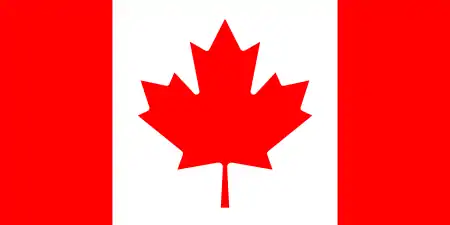Canadian Americans
Canadian Americans is a term that can be applied to American citizens whose ancestry is wholly or partly Canadian, or citizens of either country that hold dual citizenship.[1]
 .svg.png.webp) | |
| Total population | |
|---|---|
| 1,062,640 0.33% of the American population | |
| Regions with significant populations | |
| Portland, Maine • Boston • Concord • Hartford • New England • New York City • Washington • California • Washington, D.C. • Philadelphia • Orlando • Atlanta • Texas • Charlotte • Raleigh • Detroit • Columbus • Chicago • Milwaukee • Phoenix • Las Vegas • most urban areas | |
| Languages | |
| English (American • Canadian) • French (Acadian • Canadian • New England) | |
| Religion | |
| Roman Catholicism • Protestantism • Other | |
| Related ethnic groups | |
| Americans, American Canadians, Canadians |
The term Canadian can mean a nationality or an ethnicity. Canadians are considered North Americans due their residing in the North American continent. English-speaking Canadian immigrants easily integrate and assimilate into American culture and society as a result of the cultural similarities and in the vocabulary and accent in spoken English.[2] French-speaking Canadians, because of language, culture, and religion, tend to take longer to assimilate.[3] However, by the 3rd generation, they are often fully culturally assimilated, and the Canadian identity is more or less folklore.[4] This took place, even though half of the population of the province of Quebec emigrated to the US between 1840 and 1930.[5] Many New England cities formed Little Canadas, but many of these have gradually disappeared.
This cultural "invisibility" within the larger US population is seen as creating stronger affinity amongst Canadians living in the US than might otherwise exist.[6] According to US Census estimates the number of Canadian residents was around 640,000 in 2000.[7] Some sources have cited the number to possibly be over 1,000,000.[8] This number though is far smaller than the number of Americans who can trace part or the whole of their ancestry to Canada. The percentage of these in the New England States is almost 25% of the total population.
In some regions of the United States, especially New England or the Midwest, a Canadian American often means one whose ancestors came from Canada.[9]
American cities founded by or named after Canadians
- Biloxi, founded by Pierre Le Moyne d'Iberville
- Bourbonnais, named after François Bourbonnais
- Chandler, founded by Dr. Alexander J. (A.J.) Chandler[10]
- Dubuque, founded by and named after Julien Dubuque
- Juneau, named after Joe Juneau
- Milwaukee, founded by Solomon Juneau
- Mobile, founded by Pierre LeMoyne d'Iberville
- New Orleans, founded by Lemoyne de Bienville
- Ontario, founded by George Chaffey
- Saint Paul, first settled by Pierre Parrant
- Vincennes, founded by François-Marie Bissot
Canadian American Day
The Connecticut State Senate unanimously passed a bill in 2009, making June 24 Canadian American Day in the state of Connecticut. The bill allows state officials to hold ceremonies at the capitol and other places each year to honor Americans of Canadian ancestry.[11]
Aboriginal Canadian Americans
As a consequence of Article 3 of the Jay Treaty of 1794, official First Nations status, or in the United States, Native American status, also confers the right to live and work on either side of the border. Unlike the U.S., Canada has not codified the Jay Treaty. Canadian courts readily reject the Jay Treaty free passage of goods right.[12]
Study
Some institutions in the United States focus on Canadian-American studies, including the Canadian-American Center at the University of Maine,[13] the Center for Canadian American studies at Western Washington University,[14] and the SUNY University at Buffalo Canadian-American Studies Committee.[15]
Notable people
See also
- Category:American people of Canadian descent
- Canada–United States relations
- Franco-Americans
- French Canadians
- Hyphenated American
- Little Canadas
- Quebec diaspora
References
- Cain, Patrick (4 April 2014). "How to get rid of your U.S. citizenship". Global News Canada. Retrieved 26 July 2020.
- "Veta: Good vocabulary - Accent training online - American Accent". veta.in.
- l'Actualité économique, Vol. 59, No 3, (september 1983): 423-453 and Yolande LAVOIE, L'Émigration des Québécois aux États-Unis de 1840 à 1930, Québec, Conseil de la langue française, 1979.
- Barkan, Elliott Robert (1980). "French Canadians". In Thernstrom, Stephan; Orlov, Ann; Handlin, Oscar (eds.). Harvard Encyclopedia of American Ethnic Groups. Harvard University Press. p. 392. ISBN 0674375122. OCLC 1038430174.
- l'Actualité économique, Vol. 59, No 3, (september 1983): 423–453 and Yolande LAVOIE, L'Émigration des Québécois aux États-Unis de 1840 à 1930, Québec, Conseil de la langue française, 1979.
- "Program No. 65 "Who's Canadian"". This American Life. Chicago Public Radio. May 30, 1997.
- "c2kbr01-2.qxd" (PDF). Archived from the original (PDF) on September 20, 2004. Retrieved May 18, 2011.
- Stewart, Alice R. (1987), "The Franco-Americans of Maine: A Historiographical Essay", Maine Historical Society Quarterly, 26 (3): 160–179
- Mark Paul Richard, "From 'Canadien' to American: The Acculturation of French-Canadian Descendants in Lewiston, Maine, 1860 to the Present", PhD dissertation Duke U. 2002; Dissertation Abstracts International, 2002 62(10): 3540-A. DA3031009, 583p.
- "Chandler, Alexander J. (A.J.)". ChandlerpediA. Retrieved 11 June 2016.
- Edmonton Sun, April 21, 2009
- "NATIVE AMERICAN FREE PASSAGE RIGHTS UNDER THE 1794 JAY TREATY: SURVIVAL UNDER UNITED STATES STATUTORY LAW AND CANADIAN COMMON LAW". Bc.edu. Archived from the original on July 19, 2011. Retrieved May 18, 2011.
- "Canadian-American Center". Umaine.edu. March 31, 2011. Retrieved May 18, 2011.
- Canadian American Studies at WWU Archived 2007-07-01 at the Wayback Machine
- "Canadian American Studies Committee, University at Buffalo". buffalo.edu. Archived from the original on 2011-09-17.
Further reading
- Fedunkiw, Marianne P. "Canadian Americans." in Gale Encyclopedia of Multicultural America, edited by Thomas Riggs, (3rd ed., vol. 1, Gale, 2014), pp. 395-405. Online
- Hamilton, Janice (2006). Canadians in America. Lerner. ISBN 0-8225-2681-6.
- Jeffrey Simpson (2000) Star-Spangled Canadians: Canadians Living the American Dream. HarperCollins ISBN 0-00-255767-3
